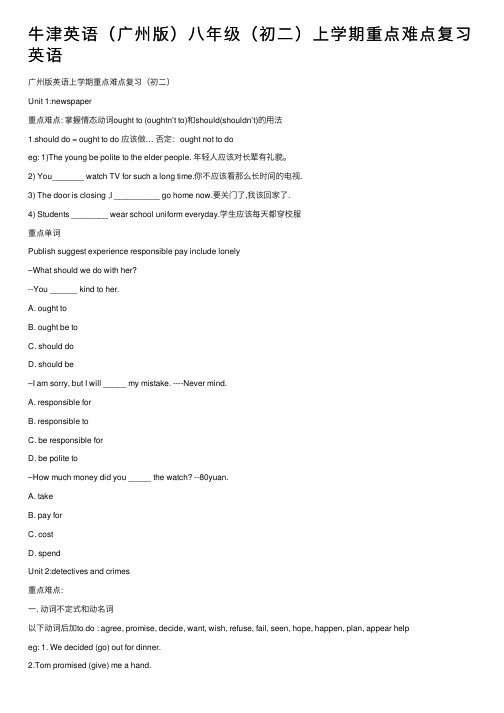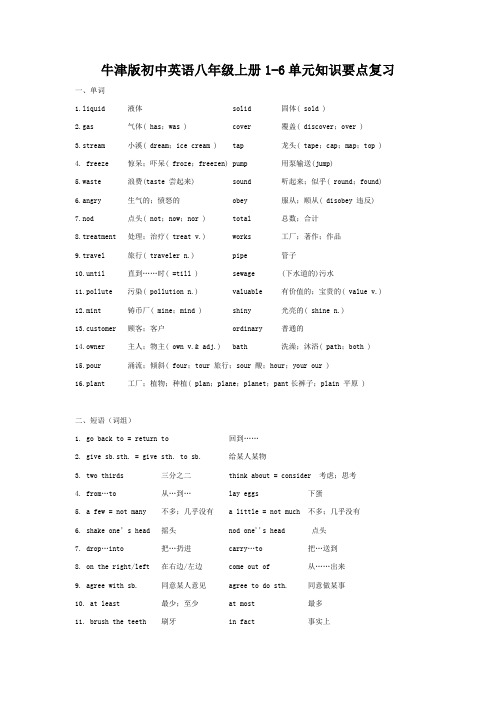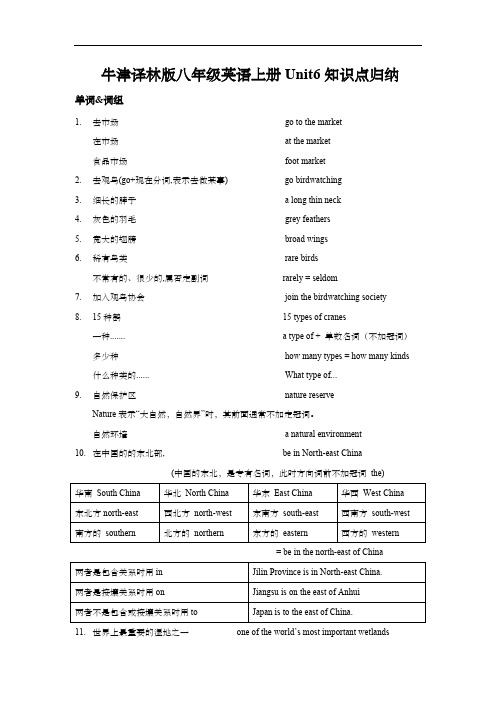新版广州牛津英语-八年级-初二-上册-第6单元 复习要点+习题(无答案)
牛津英语(广州版)八年级(初二)上学期重点难点复习英语

⽜津英语(⼴州版)⼋年级(初⼆)上学期重点难点复习英语⼴州版英语上学期重点难点复习(初⼆)Unit 1:newspaper重点难点: 掌握情态动词ought to (oughtn’t to)和should(shouldn’t)的⽤法1.should do = ought to do 应该做… 否定:ought not to doeg: 1)The young be polite to the elder people. 年轻⼈应该对长辈有礼貌。
2) You_______ watch TV for such a long time.你不应该看那么长时间的电视.3) The door is closing ,I __________ go home now.要关门了,我该回家了.4) Students ________ wear school uniform everyday.学⽣应该每天都穿校服重点单词Publish suggest experience responsible pay include lonely–What should we do with her?--You ______ kind to her.A. ought toB. ought be toC. should doD. should be–I am sorry, but I will _____ my mistake. ----Never mind.A. responsible forB. responsible toC. be responsible forD. be polite to–How much money did you _____ the watch? --80yuan.A. takeB. pay forC. costD. spendUnit 2:detectives and crimes重点难点:⼀. 动词不定式和动名词以下动词后加to do : agree, promise, decide, want, wish, refuse, fail, seen, hope, happen, plan, appear helpeg: 1. We decided (go) out for dinner.2.Tom promised (give) me a hand.3. I can’t help _____ (cry).我情不⾃禁的哭了。
广州牛津版英语八年级上册Unit6试题及答案

广州牛津版英语八年级上册Unit6试题及答案Which season do you like best? I love summer best because you can do much outside, like going to the park after a long day’s work. In summer it’s very nice to go camping and sit next to a fire with a drink. I love to go to the ocean to swim and lie on the beach reading a book. The temperature there is lower than other places. I love to drive up to the north. The weather is sunny there. The leaves are so nice with much sunshine. I love when I wake up and hear the birds singing right there. I love summer because the flowers come out with beautiful colours. I love to sit in my backyard, for I can smell my lemon tree. I love to walk on the beach as the sun goes down before darkness and I think it is beautiful. When it is hot outside, I love to jump into a pool and I will feel so relaxed.( )36. A. after B. because C. if D. until( )37. A. like B. as C. for D. of( )38. A. sleep B. rest C. work D.( )39. A. skate B. swim C. run D. walk( )40. A. higher B. taller C. shorter D. lower( )41. A. windy B. sunny C. cloudy D. rainy( )42. A. singing B. crying C. sleeping D. reading( )43. A. come up B. come out C. come off D. come over( )44. A. earth B. moon C. Mars D. sun( )45. A. cool B. cold C. hot D. warmBACBD BABDCThis is the meaning of Jingzhe, one of the 24 solar terms (节气). They began with the farmers of China, but are still a part of Chinese culture today. Some of them are about the arrival of new seasons, others about the weather and others tell changes about the living world.Jingzhe goes back 2,500 years. When insects and other creatures wake, farmers know it's time to plough the land. Chinese farmers take insects very seriously. Insects show them how the world of nature is changing and so help them with their work.One of the insects which wake up is the cricket(蟋蟀). In the spring there are millions again. The air is filled with the beautiful sound of their singing.Cricket culture has long been important in China. Crickets were first loved for their singing. The ladies of the palace put them in cages so they could listen to them sing in winter.Listen out for them – perhaps you'll be lucky enough to catch their first songs!( )46. We can tell from the story that jingzhe is a solar term _____.A. about the arrival of new seasonB. about the weatherC. about the changes of the living worldD. about the time of getting in crops( )47. When Jingzhe comes, farmers should ___.A. plough the landB. feed some insests and other creaturesC. kill some insects and other creaturesD. get in the crops( )48. What does the underlined word “insects” mean?A. 家禽B. 家畜C. 耕牛D. 昆虫( )49. People loved crickets because ____.A. they can tell people an important seasonB. they can sing for peopleC. they can help farmers do lots of workD. they can help the crops grow( )50. The passage mainly tells us ____A. what the 24 solar terms areB. something about the four seasons of ChinaC. how Jingzhe formedD. the living conditon of cricketCai Jingshu, 14, loves English. She reads English newspapers every week and often tries to talk with foreigners from other countries. “Many of us want to study abroad and find out more about English language culture,” said the girl.However, for Cai’s aunt, 45-year-old Bin Changzheng, studying English was a different story. When she first studied English in 1977, she and his classmates spent nearly half a year learning the 26 letters and the phonetic symbols (音标). After the letters, she and her classmates learned some simple words, such as “desk”, “pen” and “pencil”. Then they studied simple sentences. For example, “This is a pen”. And “That is a desk”. “It was really hard for us to learn English words. There were no other materials, like English movies or music to help us,” said Bin.Thanks to policies of the government, English studies in China have greatly improved over the past 30 years.However, now that the country has opened its doors to the world, it needs better English. “Sometimes I feel envious of my aunt. She didn’t have to deal with so many difficult English exams,” said Cai.( )1. A. friends B. foreigners C. classmates D. teachers.( )2. A. good B. same C. bad D. different( )3. A. spent B. took C. cost D. waste( )4. A. Before B. During C. After D. While( )5. A. words B. sentences C. texts D. topics( )6. A. spoke B. heard C. studied D.( )7. A. easy B. hard C. happy D. unhappy( )8. A. months B. days C. hours D. years( )9. A. closed B. opened C. built D. broke( )10. A. easy B. difficult C. different D.BDACA ACDBBWe got to the other planet and we were on our way back to earth.Suddenly, a UFO appeared and it made our spacecraft to land on another planet.On the planet, a very strange looking aliens(外星人)met us. He took my friends and me to see its master. All the aliens had four eyes, two heads and six legs. They had a white body and no hair.The planet looked like a prison(监狱). We were scared (害怕的)but they gave us some food. No one ate the food.The next day, they gave us a long list of things to do, but we couldn’t understand them at all. They put us in a small cell. After that, they did experiments(实验)on us. A few of us died but they put the rest of us back into the cell.One day, the aliens who brought us to our cell forgot to lock the door so we ran away. Soon we flew back to earth in our spacecraft. We told people about our experience but no one believed us! After this, I never go into space ever again.( )51. The underlined word appeared may mean____A. 出现B. 出击C. 出发D. 出走( )52. What did the creature Jim and his friends saw look like?A. 图:正常人B. 图:四只眼、两个光头、六条腿的怪物C. 图:四只眼、两个长满头发的头、六条腿的怪物D. 图:三个光头、六条腿的怪物( )53. Which of the following is true?A. Jim’s friends are creatures on another planet.B. The aliens was very kind to Jim and his friends.C. Jim and his friends can walk about freely on the planet.D. The aliens wanted to do some research on Jim and his friends.( )54. Jim and his friends could run away from the strange planet because ____.A. a kind alien helped themB. a careless alien gave them a chance to do soC. they beat the aliensD. the aliens finished the experiment and let them go ( )55. The best title of the passage should be ____.A. A Horrifying Experience in SpaceB. Strange Creatures on Another PlanetC. A Successful Mission into SpaceD. A Prison-like PlanetOnce a boy loved sweets very much. He always asked for sweets from his father. His father was poor and he could not always afford sweets.The boy’s father thought hard about how to stop the child asking for so many sweets. He decided to take the boy to the a great man nearby. He thought the great man might stop the child asking for sweets.When the father asked the great man to stop his son sweeting, the great man told the father to bring his son back after one month.A month later, the boy and his father returned. The man said to the boy “My dear child, will you stop asking for sweets?Your father is poor and he cannot give you enough.” From then on, the boy stopped asking for sweets.The boy’s father asked the saint, “Why didn’t you ask my son to give up asking for sweets a month ago?” The old man answered, “How could I ask a boy to give up sweets when I loved sweets myself? In the last month I gave up eating sweets.”When we ask someone to do something, we must do it ourselves first.( )1. A. asked B. said C. looked D. made( )2. A. rich B. clever C. foolish D. poor( )3. A. with B. about C. of D. to( )4. A. hated B. thought C. decided D. chose( )5. A. lead B. stop C. make D. let( )6. A. bring B. take C. carry D. give( )7. A. before B. end C. later D. ago( )8. A. How B. Why C. When D. What( )9. A. himself B. herself C. yourself D. myself( )10. A. then B. first C. second D. lastADBCB ACBDBSome people say that English is an easy lanuage to learn. At the same time they think that Chinese is the most difficult. But is that true?It depends on many things. Chinese, for example, has no tense, but its wrting system is very difficult from that of English. One thing might be harder, but the other is simpler. I think English is neither easy nor difficult. With experience and practice, it becomes easier. Without experience, it is harder than the other languages. What makes a language easier? First, you should use it often. Second, if you are interested in it, it will become easier. Third, it’s a good idea to read articles in that lanuage. Finally, talk with people in that language. Each language has its peculiarities, that is, easy and hard features of it. Of course if your mother tongue shares the same things with the language you are learning, things will be easier.( )1. A. Japanese B. French C. Chinese D. Russian( )2. A. lives on B. feeds on C. keeps on D. depends on( )3. A. easy B. dificult C. quick D. slow( )4. A. and B. so C. but D. because( )5. A. the other B. another D. other D. others( )6. A. often B. usually C. never D. sometimes( )7. A. at B. on C. in D. with( )8. A. read B. write C. listen D. speak( )9. A. Clearly B. Finally C. Nearly D. Recently( )10. A. his B. her C. their D. itsCDBCA ACABD。
广州市Unit6 单元知识点和练习(含答案)2021-2022学年牛津深圳版八年级英语上册

初二英语同步学案Unit 6 Ancient StoriesWarm-up: Reading(一)朗读The captain stood on the high wall of the city of Troy. The Greeks lost the war and have gone. They have tried to capture Troy for ten years . Now they have given up and sailed away. But they have left a huge wooden horse outside the city. The captain ordered his soldiers to pull it into the city.That night, in the main square of the city, all the Trojans celebrated. They sang and danced around the horse, and made jokes about the stupid Greeks. After the party, they locked all the gates of the city and all went to sleep. By midnight, the main square was empty, except for the huge horse. Suddenly a secret door opened on the side of the wooden horse. The Greek soldiers quietly climbed out of the horse one by one and opened the main gates. The Greeks army entered the city and captured the city.(二)情景对话1.What’s the weather like in winter in Beijing?2.How many times have you been to the Wild Animal Zoo in Panyu?3.What were you doing at this time yesterday?4.Which country is bigger, America or China?5.What will you say to Sally if she helped you with your English?(三)简短说话在英语主题班会上,谈谈你对保持健康的建议。
牛津译林版八年级英语上册Unit6单元知识复习归纳

牛津译林版八年级英语上册8A Unit 6 Birdwatching单元复习一、重点单词1.birdwatching观鸟2.market市场3.hen母鸡4.sparrow麻雀5.feather羽毛6.swan天鹅7.broad宽的,宽大的8.wing翅膀9.type种类10.rare罕见的,稀有的11.nature大自然,自然界12.wetland(尤指为野生动物保存的)湿地13.provide提供14.cover庇护所15.wildlife野生动物16.perfect极好的,完美的17.round周同,绕一整圈;转过来18.while然而19.stay停留,逗留20.easily容易地,不费力地21.cent分;分币22.space空间23. lead领导,带领24.fisherman(pl. fishermen)渔民,钓鱼的人25. fish捕鱼;钓鱼26.government政府27. prevent防止,预防28. society协会;社会29.record记录30.change变化,改变31.tourist旅行者,观光者32. count计算(或清点)总数;数数33.describe描述34.understand理解,明白35. importance重要性36.south-east东南方37. cover覆盖;包括38.clearly清晰地39. speaker说话人;演讲者40. tour旅行41.form表格42.address地址43.chairperson主席44. introduce介绍45.natural自然的,天然的二、重点短语1.go to the market去市场2.how many types of cranes多少种类的鹤3.in North-east China在中国的东北部4. one of the world's most important wetlands世界上最重要的湿地之一5. provide food and cover for a lot of wildlife给许多野生动物提供食物和庇护所6.a perfect place for some rare birds对一些稀有鸟类来说的完美地方7.all year round -年到头8.for a short stay作短暂停留9. 40 per cent of them它f门中的40%10. make the wetlands smaller使湿地更小11. in order to以便,为的是12. lead to导致13. less and less越来越少14. keep fishing不断捕鱼15. the Chinese government中国政府16. prevent all these things in Zhalong阻止这些事情在扎龙发生17. record their types and changes in their numbers记录下它们的种类和数量上的变化18. understand the importance of the wetlands了解湿地的重要性19. stop something from happening阻止某事发生20. write down写下,记下21. walk a long way走很长的路22. different kinds of不同种类的23. fly to Yancheng飞往盐城24. go birdwatching去观鸟25. take a pair of binoculars带一副望远镜26. get thirsty渴了27. make beautiful sounds发出美妙动听的声音28. bird shows鸟展29. part of our lives我们生命的一部分30. introduce myself自我介绍31. enjoy the natural world享受自然世界32.a member of……的一员33. take part in activities参加活动34. call me on拨……号码给我三、重点句子及点拨1.I often go to the market to watch the birds.我经常去市场看鸟。
Unit 6 【单元测试 基础卷】-八年级英语上册单元速记巧练(牛津沪教版)

Unit 6 【单元测试·基础卷】一、根据首字母填空二、单项选择A.very tiny B.very big C.very smartA.like B.for C.withoutA.follow B.hear C.believeA.learn from B.laugh at C.help withA.took off B.fell asleep C.got upA.stupid B.friendly C.strict 14.—Look! It must be Millie in the playground.—It can’t be her. I saw her enter the library just now.A.come back B.go into C.run towardsA.At least B.At first C.At last16.A _______ is a clever way of doing something that works very well.A.side B.trick C.prize17.To ________ means to show that a day or an event is important by doing somethingspecial on it.A.promise B.capture C.celebrate18.In some cities, the air is ______ pollution. This often makes people ill.A.full of B.interested in C.popular with19.If a bottle is ________, it doesn’t have anything in it.A.strong B.empty C.heavy20.The mother didn’t want to wake up her child, so she closed the door _________.A.rudely B.quietly C.noisily21.The teacher asked the students to learn the dialogue by heart and then ______ in pairs the next day.A.find it out B.pick it up C.act it out 22.—Where is my schoolbag? I can’t find it.— ________ ! We’ll be late for school.A.Just a minute B.Don’t worry C.Come on三、完成句子四、汉译英:整句51.现在他们已经放弃,并驾船离开。
牛津译林版八年级英语上册unit6单元知识点归纳

第六单元知识点归纳三、重点句子及句型:1.I didn't hear the rain until half hour later .2.Who’s going to mop it up if you don’t come with me?3. A young boy fell from a tree and hurt his legs.4.At first, I felt a slight shaking through my body.5.People ran in all directions. They didn’t know where to go.6.Some people ran out of the shopping centre. I tried my best to run out to the street, too.7.People ran wildly as pieces of glass and bricks fell down. Then the walls began to come down too.8.I did not even know where I was(宾语从句,陈述性语序).9. A moment of fear went through my mind but I told myself to calm down since I was still alive.10.People were in a great hurry to move away the bricks and stones.11.He survived the earthquake in 1999.12.It rained/snowed heavily last night.= There was a heavy rain/snow last night.13.How heavily it rained last night ! What a heavy rain last night !14.Why didn't your father drive you to school as usual ?15.His car broke down because of the bad weather .16. A man named Su Ning called the 110 using his mobile phone.17.Mr Su felt cold and frightened but he was not badly hurt.18.Bad weather sometimes causes natural disasters.19.Her school caught fire because lightning hit it.20.The video shows the terrible situation after the earthquake .21.I could no t see anything at al l .22.What happened to me !23.I told myself I must stay alive .1.直到半小时之后我才听到雨声。
牛津版初中英语八年级上册1-6单元知识要点复习

牛津版初中英语八年级上册1-6单元知识要点复习一、单词1.liquid 液体 solid 固体( sold )2.gas 气体( has;was ) cover 覆盖( discover;over )3.stream 小溪( dream;ice cream ) tap 龙头( tape;cap;map;top )4. freeze 惊呆;吓呆( froze;freezen) pump 用泵输送(jump)5.waste 浪费(taste 尝起来) sound 听起来;似乎( round;found)6.angry 生气的;愤怒的 obey 服从;顺从( disobey 违反)7.nod 点头( not;now;nor ) total 总数;合计8.treatment 处理;治疗( treat v.) works 工厂;著作;作品9.travel 旅行( traveler n.) pipe 管子10.until 直到……时( =till ) sewage (下水道的)污水11.pollute 污染( pollution n.) valuable 有价值的;宝贵的( value v.)12.mint 铸币厂( mine;mind ) shiny 光亮的( shine n.)13.customer 顾客;客户 ordinary 普通的14.owner 主人;物主( own v.& adj.) bath 洗澡;沐浴( path;both )15.pour 涌流;倾斜( four;tour 旅行;sour 酸;hour;your our )16.plant 工厂;植物;种植( plan;plane;planet;pant长裤子;plain 平原 )二、短语(词组)1. go back to = return to 回到……2. give sb.sth. = give sth. to sb. 给某人某物3. two thirds 三分之二 think about = consider 考虑;思考4. from…to 从…到… lay eggs 下蛋5. a few = not many 不多;几乎没有 a little = not much 不多;几乎没有6. shake one’s head 摇头 nod one''s head 点头7. drop…into 把…扔进 carry…to 把…送到8. on the right/left 在右边/左边 come out of 从……出来9. agree with sb. 同意某人意见 agree to do sth. 同意做某事10. at least 最少;至少 at most 最多11. brush the teeth 刷牙 in fact 事实上12. come / be from 来自 clean ... up = make ... clean 打扫干净13. be angry with sb. 生某人的气 be angry about/at sth. 因某事生气14. in the first place = at first 首先;起初in the end = at last = finally 最后;最终15. turn ...off/on 关闭 / 打开(电器等)turn ... up / down 调高/调低(声音/音量)三、句型结构1. use sth. to do sth. = do sth. with sth. 用某物去做某事2. do one’s best(to do sth.) 尽某人最大努力去做某事We should do our best to learn English well. 我们应该尽力学好英语。
牛津译林版八年级英语上册Unit6知识点归纳

牛津译林版八年级英语上册Unit6知识点归纳单词&词组1.去市场go to the market在市场at the market食品市场foot market2.去观鸟(go+现在分词,表示去做某事) go birdwatching3.细长的脖子 a long thin neck4.灰色的羽毛grey feathers5.宽大的翅膀broad wings6.稀有鸟类rare birds不常有的、很少的,属否定副词rarely = seldom7.加入观鸟协会join the birdwatching society8.15种鹤15 types of cranes一种....... a type of + 单数名词(不加冠词)多少种how many types = how many kinds 什么种类的...... What type of...9.自然保护区nature reserveNature表示“大自然,自然界”时,其前面通常不加定冠词。
自然环境 a natural environment10.在中国的的东北部, be in North-east China(中国的东北,是专有名词,此时方向词前不加冠词the)华南South China华北North China华东East China华西West China 东北方north-east西北方north-west东南方south-east西南方south-west 南方的southern北方的northern东方的eastern西方的western= be in the north-east of China两者是包含关系时用in Jilin Province is in North-east China.两者是接壤关系时用on Jiangsu is on the east of Anhui两者不是包含或接壤关系时用to Japan is to the east of China.11.世界上最重要的湿地之一one of the world’s most important wetlands= one of the most important wetlands in the world 12.为……提供食物和庇护所provide food and cover for sb= provide sb with food and coverprovide sth for sb = provide sb with sth为某人提供某物Give sb sth = give sth to sbOffer sb sth = offer sth to sbSupply sb with sth = supply sth to sb13.孰能生巧。
